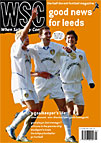 Racing Santander’s forthright new president-cum-manager has been derided by critics but, says Phil Ball, he might just be on the right track
Racing Santander’s forthright new president-cum-manager has been derided by critics but, says Phil Ball, he might just be on the right track
Dimitri Piterman is no ordinary chap. Shortly after buying a 24 per cent majority shareholding in Racing Santander in January, the new millionaire president of the ailing Spanish top-flight club was stopped outside the entrance to the El Sardinero stadium by a TV journalist and asked if he thought that his stated intention of personally running all aspects of the club – right down to team management – was perhaps a tad over-ambitious, even arrogant? Especially when he was not qualified to do so? Piterman leaned into the beam of the cameras and eyeballed the journalist with a withering stare: “There’s a dork running the most powerful country in the world without a qualification to his name. And you ask me for a diploma to run a football team? Give me a break.” And so began one of the lengthiest media circuses witnessed in Spain over the past couple of decades, with the result that the 39-year-old Piterman has become at least as famous as Jesus Gil.
Read more…
 It’s taken a while, but African players are finally beginning to thrive in England. Alan Duncan charts the changes in both English and African football that have made this possible
It’s taken a while, but African players are finally beginning to thrive in England. Alan Duncan charts the changes in both English and African football that have made this possible